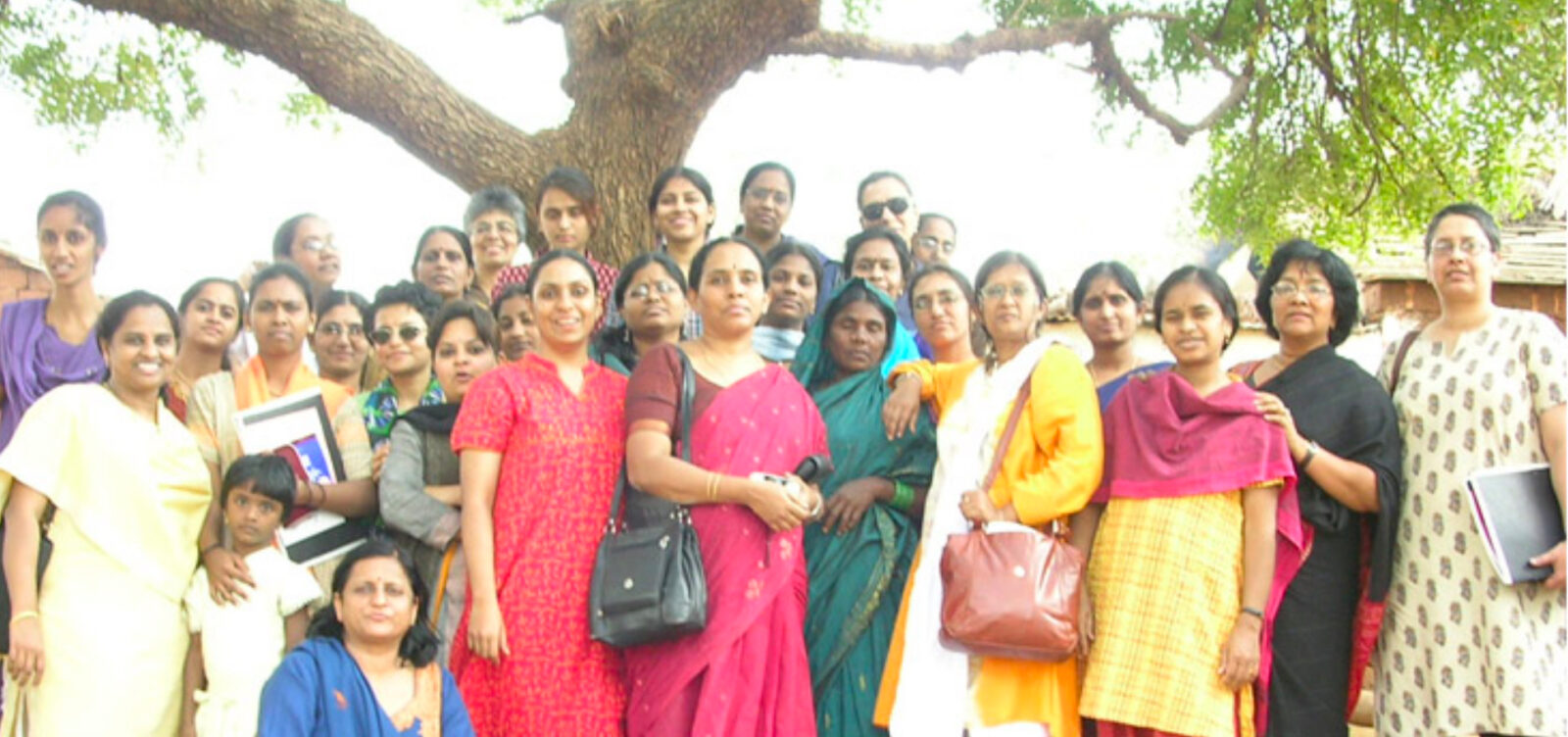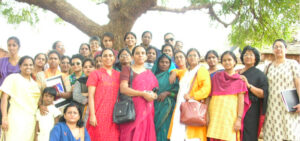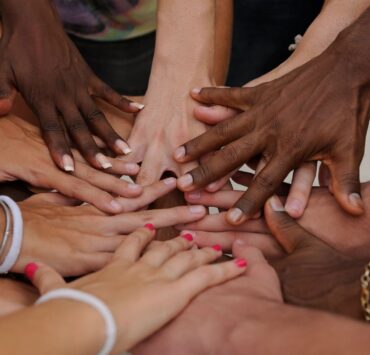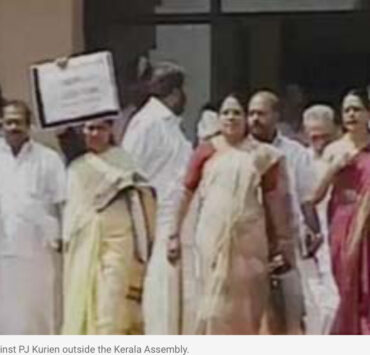
By R Akhileshwari

At the end of a successful three-day conference of the Network of Women in Media, India, in Hyderabad, topped off by an inspirational face-to-face with the women of Deccan Development Society in Pastapur, Medak district, we are on a high, delirious that it had gone off well. As a bonus, we even have a bank balance.
Not too long ago, though, we were in the depths of despair as nothing seemed to work, no one seemed to cooperate and we were at our wits’ end as to how to host 50 women journalists for three days. In a show of unnecessary bravado we had agreed to take care of boarding and lodging, confident that the government would obligingly pick up the tab. After all, some department or the other is obliging our colleagues all the time.
But we forgot one small detail. Those colleagues are all men. They give and take. They share — from a cigarette to stories to gossip. They network all the time. They meet over a drink, over one-by-two chai, and bond. We women journalists are literally outsiders, meeting officials and politicians only for work, for a quote, for a story and no more. We do not cultivate even women ministers and politicians. Many among us who work on the desk don’t have even this opportunity. We were naive, idealistic and hopeful without reason. Our needs were few; demands even fewer. So we argued. I suspect we even thought it was our right to expect the government to oblige us in furthering our network as a matter of promoting the public good.
All our efforts to find a decent place to accommodate the participants came to naught, because we were looking for either subsidised rates or even gratis, if possible. We explained, rather self-righteously, that as a policy NWMI believed in self-financing. Ergo, our plea for sponsors,’ for the venue, for food and stay. We impressed no one. Suddenly, all training organisations with fine facilities of hostel and canteen seemed to be having programmes coinciding with our dates. The more supportive among them offered two or three rooms, no more, when we needed at least 10. Some offered their campuses, which were on the outskirts of the city. We ruled out this option: it would discourage local women journalists from attending a session or two and then returning to their work, if necessary. Friends suggested we spread out the participants in two or three places but we were against the idea since it would not enable after-sessions interaction. Besides, logistics of travel to and from the conference venue would have meant more coordination and complications.
Some among us got in touch with public sector organisations and government departments that seemed likely to sponsor our conference. If we thought we would be welcomed with open arms and given easy access to their pockets, we were soon disillusioned. One chief public relations officer of a public sector organisation, who had been briefed by a common friend on the reason for the visit, refused to even recognise our name or our organisational affiliation; we walked out without raising the issue of sponsorshp. If we were looking for sisterhood and solidarity as women and concrete support for our meeting from women officials and ministers, we were disappointed. The woman minister whom we approached reminded us of how we never once felt it necessary to interview her for our papers although she had done such good work in her party.
When we were getting nowhere with our plan, we decided upon plan B, which meant that we fall back upon our male friends: in the Press Academy of Andhra Pradesh, in the AP Union for Working Journalists and in the Press Club of Hyderabad. Even before we asked for their help they offered both ideas and concrete support to help hold the conference. The Press Academy offered us its conference hall, breakfast and lunch, along with tea and snacks, for all the three days. The APUWJ offered to hand over the next issue of its monthly magazine, Pratispandana,” to us to bring out a special issue on women in media to coincide with the national conference; we could canvass for advertisements for the journal and use the money to help pay for the conference. The Press Club offered to host a dinner. We grabbed all three offers. The best part of the deal was that the newly built hotel next to the Press Academy offered us rooms at a subsidised rates and deferred payment, thanks to the intervention of the chairman of the Press Academy.
But then the major challenge in front of us was to mobilise advertisements—something we were reluctant to do, partly to avoid money matters, which invariably lead to disagreements and falling out, and partly because none of was inclined nor had the time to knock on all kinds of doors. The first door we knocked on, of a government official with whom most of us constantly interact, threw us a challenge: let me how much you raise … then come to me and I will see what I can do, he said. We returned empty-handed, seething and disappointed. How dare he treat us like children, we fumed. More such experiences followed and we were plumbing the depths of despair.
Then we decided on a two-pronged approach: one, since in any case we were gathering data from media organisations for a presentation at the conference on whether the media was following the Supreme Court directive to set up sexual harassment complaints cells in organisations that employed women we considered tagging on our request for an advertisement. Two, each person would approach her friends/contacts and get at least one advertisement. It worked! At least five media organisations obliged us. In one of them, the owner-editor of a small newspaper asked no questions and straight away wrote out a cheque. The worst experience was with the owner-editor of another paper, who gave an appointment for a meeting but did not call us in even after 50 minutes. When we sent a reminder he responded with the message that he had to attend to several important matters. We left.
For the ‘each one get one’ strategy, we decided to approach only those whom we knew. Contacts among corporates, politicians, and industries would be approached by the individual initially but a group of us would go with the official request. This was basically to strengthen our case and to give an impression of a collective effort rather than an individual one. Also, to some extent, the obligation for the favour would not rest on a single individual but on the entire group. An editor-friend chipped in, so did an admirer-industrialist; a colleague in the advertisement department was eager to return favours taken from us journalists and got us three advertisements; manufacturers, too, decided to pay back in appreciation of stories done earlier; a corporation chairman-friend pulled out a thick wad of notes and offered it to us, leaving us open-mouthed in stupefication. Some simply gave to encourage the first-of-its kind effort; others out of belief in the cause of women. In the case of a businesswoman, we did not even meet her. She agreed on the phone and, on the basis of an e-mail, sent us a cheque.
The lesson we learnt from the experience: Network, network, network…with government officials and ministers, with corporate houses, with businesswomen and … with men journalists. So that women in media can network better!




